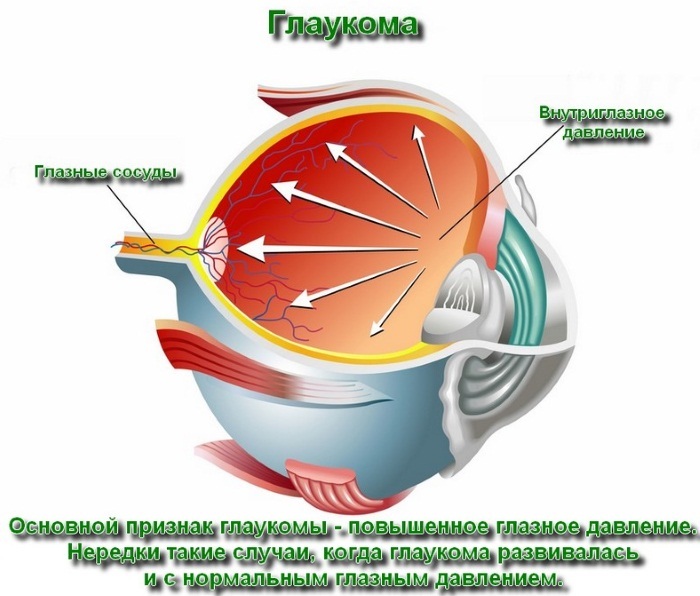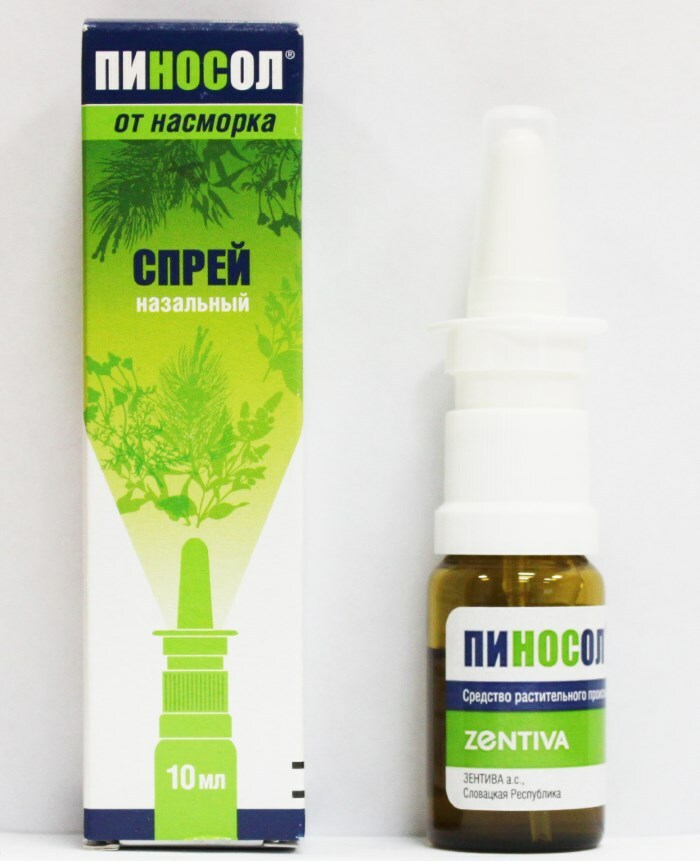Antibacterial nasal drops - These are drugs with a broad spectrum of action that are active against most gram-positive and gram-negative microorganisms. Medicines of this category are prescribed in extreme cases when the use of antibiotics is a necessary measure of therapy.
Record content:
- 1 When are nasal antibacterial drops needed?
- 2 Benefits of topical drop treatment
- 3 Contraindications for use
- 4 Forms of issue
- 5 Recommendations for choosing nasal drops
- 6 How to bury your nose?
-
7 List of antibacterial nasal drops for adults
- 7.1 Isofra
- 7.2 Polydexa
- 7.3 Protargol
- 7.4 Framinazin
- 7.5 Rinofluimucil
- 7.6 Bioparox
- 7.7 Sinupret
- 7.8 Bilitong
- 8 What to drip into the nose during pregnancy, lactation?
- 9 What can children bury?
- 10 Antibiotic drops video
When are nasal antibacterial drops needed?
Antibacterial nasal drops are indicated for use in adults and children with the following diseases of bacterial etiology:
- acute or chronic rhinitis;
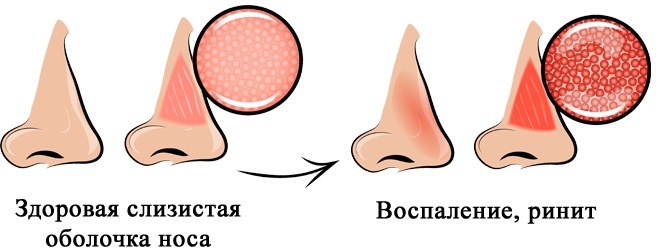
- primary and recurrent sinusitis;
- sinusitis without signs of damage to the nasal septa;
- restoration of the nasopharynx after injuries and surgical interventions.
Antibacterial nasal drops can be used in the complex therapy of inflammatory and infectious diseases of the upper respiratory system.
Benefits of topical drop treatment
The main advantage of topical application of antibacterial nasal drops is their local action. directly to the site of the infectious and inflammatory process, which is localized in the upper sections nasopharynx.
The constituent components of the drug do not saturate the blood, practically do not undergo metabolism in the liver tissues, and also do not create an additional load on the kidneys' performance. Due to the local action of antimicrobial drops, it is possible to achieve an excellent antiseptic effect with a minimal risk of adverse reactions.
Contraindications for use
Antibacterial nasal drops are categorically contraindicated for use in in relation to children and adults who have the following diseases or pathological conditions of the body:
- individual intolerance to the constituent components of the drug;
- diseases for the treatment of which it is necessary to wash the paranasal sinuses;
- violation of the integrity of the nasal septa;
- allergic reactions to antibiotics of this pharmacological group.
Most antibacterial drops are not used to treat women who are pregnant or breastfeeding a newborn.
Forms of issue
Antibacterial nasal drops are available in the form of medicinal solutions, sprays and aerosols. Filling of drugs is carried out in glass vials or plastic bottles.
Together with the antimicrobial medication, a pipette can go, or the nasal drops are equipped with a convenient dispenser stopper. The main packaging of the drug is a cardboard box, inside which contains detailed instructions for the use of this antibiotic.
Recommendations for choosing nasal drops
The choice of nasal drops with an antibacterial spectrum of action should be based on direct medical indications for their use. You should choose the drug, the constituent components of which are effective against bacterial microorganisms found in the patient's nasal passages.
This will require a preliminary examination of the upper respiratory tract, swabs and samples of mucus released from the nasal cavity. Otherwise, antibacterial treatment may not bring a positive result.
How to bury your nose?
The introduction of nasal drops into the nasal passages should be carried out in compliance with the following rules:
- You need to lie on your back with your head thrown back as high as possible.
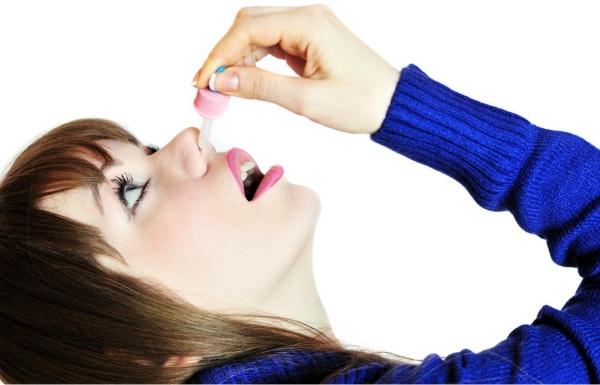
- Bring the bottle with the drug or a pipette with the collected solution to the tip of the nose.
- Add 1-2 drops of antibiotic in turn into each nasal opening.
- Maintain a horizontal position for 5-7 minutes so that the medicinal solution does not flow out of the nasal cavity.
After the specified period of time, you can get out of bed and lead a normal life. The next nasal instillation should be performed according to the therapeutic schedule drawn up by the attending physician.
Some types of nasal sprays are shown to be applied into the nose while holding the bottle in an upright position. In this case, the patient should be standing or sitting. These rules for the use of drops of a particular type are displayed in their instructions for use.
List of antibacterial nasal drops for adults
In the process of treating infectious diseases of the upper respiratory tract, nasal sprays based on various antibacterial components are used. The selection of drugs in this group is carried out taking into account the strain of bacterial microorganisms.
Isofra
Isofra are antibacterial drops that contain the active substance framycetin sulfate. This chemical compound belongs to antibiotics from the aminoglycoside group.
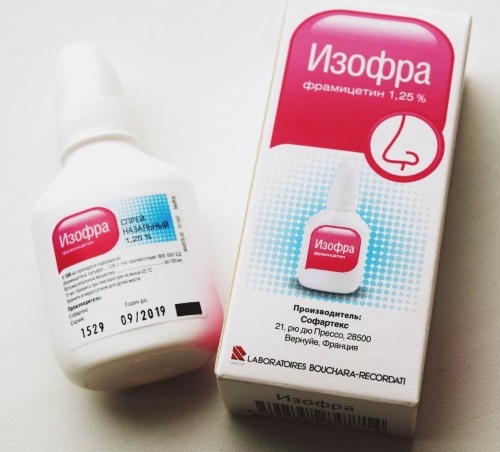
The drug has pronounced bactericidal properties, suppressing disease-causing activity gram-positive and gram-negative microorganisms parasitizing the mucous membrane of the upper respiratory tract.
Isofra is prescribed for the treatment of infectious rhinitis, sinusitis, sinusitis, nasopharyngitis, which are characterized by a chronic form of the course, or are in a state of exacerbation.
The drug Isofra is contraindicated for use during pregnancy and lactation with breast milk. The medication cannot be used in relation to patients who are prone to allergic reactions to antibiotics from the aminoglycoside group. Patients of the adult age group are shown to apply 4-6 spray injections into the nose per day for 7 days.
In the absence of a therapeutic effect, the occurrence of additional symptoms of an infectious and inflammatory process in the upper respiratory tract, you should contact your doctor for additional consultations. The average cost of this medication is 340 rubles.
Polydexa
Polydexa is a nasal spray that contains the following active ingredients:
- neomycin sulfate;
- phenylephrine hydrochloride;
- polymyxin sulfate;
- dexamethasone metasulfobenzoate.
Polydexa is a completely transparent antibacterial solution without a specific odor. The drug belongs to the pharmacological group of broad-spectrum glucocorticosteroids.
The drug has not only bactericidal properties, but also has a strong anti-inflammatory effect on the nasal mucosa and other tissues of the upper respiratory tract. Spray Polydex is indicated for use in infectious rhinitis, sinusitis, sinusitis, nasopharyngitis.
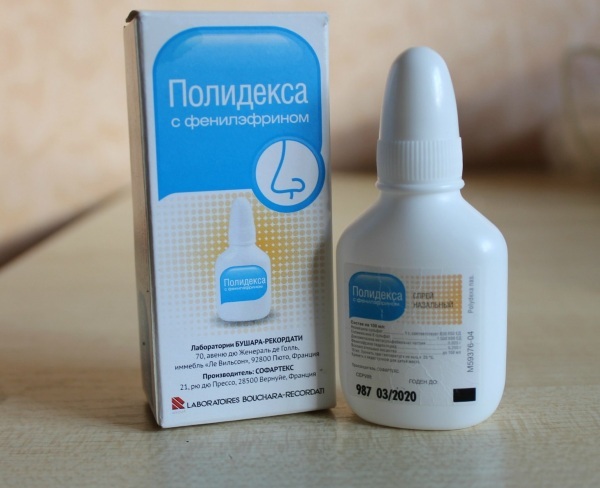
Polydex nasal drops are categorically contraindicated for use in the following cases:
- the state of pregnancy;
- breast-feeding;
- children's age up to 2.5 years;
- viral diseases of the nasopharynx;
- closed glaucoma;
- severe kidney pathology;
- intolerance to the constituent components of the drug.
Patients of the adult age group use the spray by injecting it into the nasal cavity 3 to 5 times a day. The duration of the therapeutic course is no more than 10 days. The average cost of nasal drops is 385 rubles.
Protargol
Protargol is a nasal drops with bactericidal properties, the active ingredient of which is silver proteinate. The main form of release of this drug is a solution with a concentration of 0.2%, which has a pronounced brown tint.
The action of the Protargol spray is due to the inhibition of cell division of bacterial microorganisms that parasitize in the cavity of the nasal canals. The medication has a safe composition and high antiseptic activity.
Protargol is indicated for use to eliminate inflammatory edema of the nasal mucosa and to combat all types of diseases of the upper respiratory tract of infectious etiology.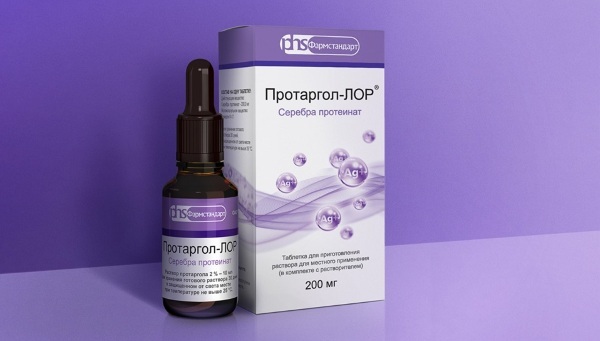
The main contraindication to the use of the medication is an allergic reaction to its constituent components. Protargol is introduced into the cavity of the nasal canals 1-2 drops from 2 to 3 times a day. The course of therapy is 5 to 10 days. The average cost of a medicine is 195 rubles.
Framinazin
Framinazin is an antibacterial drops, the active ingredient of which is framycetin sulfate from the aminoglycoside group. This drug is available in the form of a yellowish solution in vials with a capacity of 10 or 25 ml.
Framinazine is indicated for use in the treatment of infectious rhinitis, sinusitis, sinusitis, rhinopharyngitis, recovery of the upper respiratory tract after surgery or severe trauma.
The medication is contraindicated for people who have an individual intolerance to its constituent components. Women who are in a state of pregnancy, as well as breastfeeding a child, are not recommended to carry out therapy with Framinazin.
Patients of the adult age group use the drug by injecting it into the nasal passages 4 to 6 times a day. The duration of therapy is no more than 7 days. The average cost of 1 bottle of Framinazin is 340 rubles.
Rinofluimucil
Rinofluimucil is a medicinal solution for the treatment of infectious and inflammatory diseases of the upper respiratory tract, the active components of which are acetylcysteine and tuaminoheptane sulfate.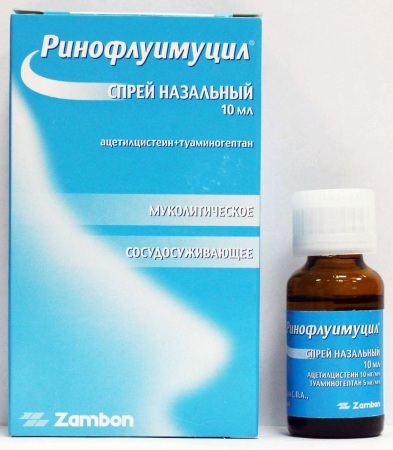
This drug is indicated for use in the presence of the following diseases:
- rhinitis;
- sinusitis;
- nasopharyngitis;
- sinusitis.
Rinofluimucil provides a quick evacuation of purulent and mucous nasal contents, the appearance of which is caused by the pathogenic activity of gram-positive and gram-negative bacteria. When applied topically, the drug is not absorbed into the general bloodstream, but acts on the inflammation focus exclusively locally.
Rinofluimucil is contraindicated for use in the following cases:
- a tendency to allergic reactions to the constituent components of the drug;
- closed glaucoma;
- thyrotoxicosis;
- concomitant use of antidepressants;
- bronchial asthma;
- arterial hypertension.
Patients of the adult age group take Rinofluimucil with a dosage of 2 aerosol injections into each nasal opening from 3 to 4 times a day. The duration of treatment is 7 days. The average cost of this medication does not exceed 315 rubles.
Bioparox
Antibacterial nasal drops, which contain the active ingredient fusafungin. Bioparox has a pronounced antimicrobial effect, exhibiting bactericidal activity against streptococcal infection, the causative agent of Staphylococcus aureus, pneumococcus.
The active ingredients of these nasal drops are effective against fungal microorganisms from the genus Candida. The drug Bioparox is indicated for the treatment of sinusitis, sinusitis, chronic and acute rhinitis of an infectious origin.
Antibacterial drops of this type are used to prevent bacterial infection of the upper respiratory tract, which have undergone surgery.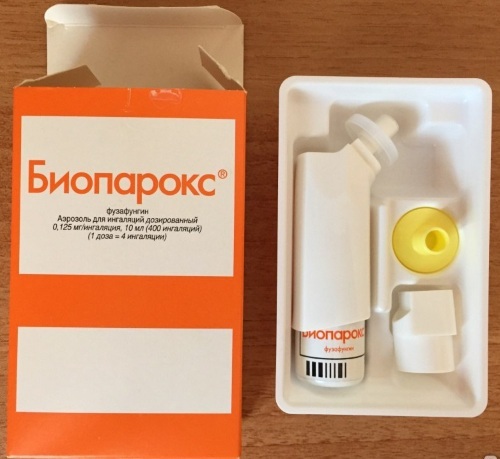
Nasal Kali Bioparox is categorically contraindicated for use in the following cases:
- hypersensitivity to the constituents of the nasal spray;
- the state of pregnancy;
- lactation of a newborn baby by breastfeeding;
- bronchial asthma or a tendency to allergic reactions to fusafungine;
- children under 12 years of age.
The drug is prescribed for use in 2 injections into each nasal canal up to 4 times a day. The duration of the therapeutic course is 7 days.
If, after 1 week of treatment, the symptoms of the disease do not go away, new signs of an infectious lesion appear upper respiratory tract, you should consult an otolaryngologist for the appointment of more potent drugs. The average cost of Bioparox nasal drops is 395 rubles.
Sinupret
Sinupret is a topical drug that has a pronounced anti-inflammatory effect. This nasal spray contains natural ingredients in the form of gentian root, sorrel leaves, elder flowers, primrose, verbena stems. Sinupret is prescribed for the treatment of chronic and acute sinusitis, sinusitis, rhinitis, frontal sinusitis.
Nasal drops of this type have the appearance of a yellow solution with a slight brown tint. With long-term storage at the bottom of the vial with the medicine, sediment may precipitate, which does not reduce the therapeutic properties of this medicine.
Sinupret nasal drops are contraindicated in patients of all age groups who have the following diseases:
- epilepsy;
- chronic alcoholism;
- functional disorders of the liver or severe diseases of this organ, the course of which is accompanied by mass death of hepatocytes (cirrhosis, an acute form of viral or intoxication hepatitis, oncology);
- brain injuries that have led to dysfunctions of the central nervous system.
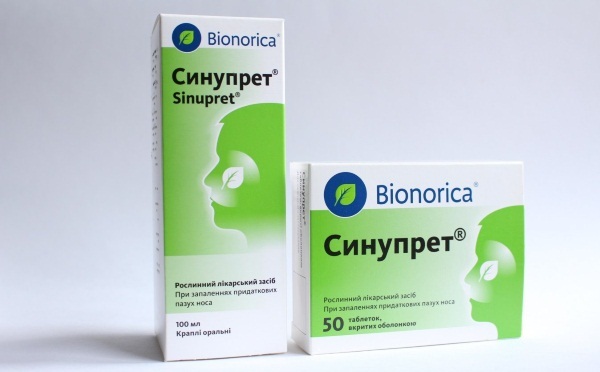
The drug is also contraindicated in children under 2 years of age. Sinupret is not recommended for use in women who are pregnant or breastfeeding.
The restriction on the use of the medication is due to the lack of clinical data on the effect of the constituent components of the drops on the body of the developing fetus and newborn children. The average cost of this drug is 350 rubles.
Bilitong
Bilitong is a Chinese-made nasal drops that have antibacterial and antiviral effects at the same time.
The drug is prescribed for the treatment of the following diseases of the upper respiratory tract:
- chronic and acute sinusitis of bacterial etiology;
- inflammatory processes occurring on the surface of the mucous membrane of the nasal canals and maxillary sinuses;
- the period of rehabilitation of the tissues of the nasopharynx after undergoing surgery, as well as severe injuries;
- colds, accompanied by a weakening of the local immunity of the nasopharynx and the risk of contracting a bacterial infection.
During an unfavorable epidemiological situation, the medicinal solution can be used for prophylactic purposes. Bilitong medicinal solution has pronounced antiseptic properties, which are provided the therapeutic effect of its main components in the form of an extract of chrysanthemum, mint, honeysuckle, angelica Daurian.
The nasal spray is contraindicated in the following cases:
- an allergic reaction to the constituent components of the drug;
- acute inflammation of the tissues of the nasopharynx, which requires the use of other methods of treatment;
- the state of pregnancy;
- period of breastfeeding;
- childhood.
The process of treatment with Bilitong nasal spray provides for the introduction of the drug into the cavity of the nasal canals 1-2 drops up to 3 times a day. The maximum duration of the therapeutic course is 5 days, during which the patient must get rid of the signs of an inflammatory disease in the upper respiratory tract.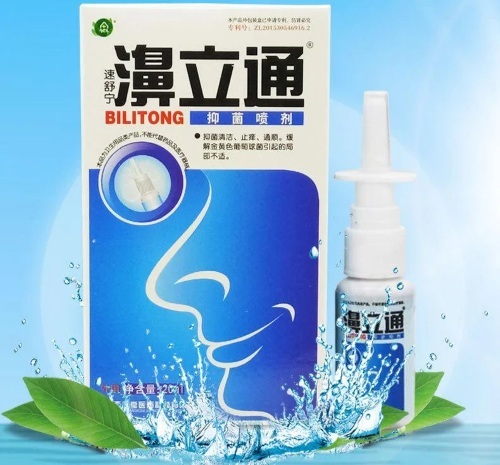
If, after the specified period of time, a positive therapeutic effect has not occurred, then you should consult an otolaryngologist for additional advice. The average cost of Bilitong spray in retail pharmacy chains is 350 rubles. per bottle with a capacity of 20 ml. The drug is dispensed without a prescription, and its shelf life does not exceed 2 years.
What to drip into the nose during pregnancy, lactation?
Women who are pregnant and who are breastfeeding should not use antibacterial nasal sprays. The limitation in the use of drugs of this group is associated with the negative effect of antibiotics on the process of fetal development, the formation of internal organs, systems and tissues of the child's body.
The appointment of nasal drops based on antibacterial components is carried out only in extreme cases, when there is a real threat to the life of the expectant mother. If during lactation it is decided to use antibacterial drops, then breastfeeding should be discontinued.
What can children bury?
Antibacterial nasal drops are approved for use in patients of the pediatric age group, but in much lower dosages.
The table below lists the main antibiotic drugs used to treat infectious sinusitis, sinusitis, rhinitis, nasopharyngitis and other inflammatory diseases of the upper respiratory tract infectious etiology.
| Name of the nasal spray | Dosage and age of the child from which the medication is allowed |
| Isofra | It is used to treat children of all age groups. For therapeutic purposes, a dose is used - 3 injections per day. The course of treatment is 7 days. |
| Polydexa | The drug is approved for use in children over the age of 2.5 years. The recommended dosage of the medication is 3 injections per day. The duration of the therapeutic course is from 5 to 10 days. |
| Protargol | Nasal drops of this type are used for children of all age groups. The recommended dosage is 1-2 drops, which are introduced into the cavity of the nasal openings 2 to 3 times a day. The duration of treatment is 1-2 weeks. |
| Framinazin | Antibacterial drops are applied in compliance with the dosage in the form of 3 injections per day with a duration of a therapeutic course of 7 days. Framinazine is used for children of all age groups. |
| Bioparox | This type of nasal drops is indicated for admission to children from 12 years old. The optimal dosage of the drug is 1 injection into each nostril up to 4 times a day. The duration of treatment should not exceed 7 days. |
| Rinofluimucil | Antibacterial drops of this type are used to treat children of all ages. The drug is used in a dosage of 3 injections per day for 7 days. |
Antibacterial nasal drops are effective broad-spectrum drugs that have bactericidal activity in relation to streptococcal infection, Staphylococcus aureus, pneumococcus and most other gram-positive and gram-negative microorganisms.
Medicines of this group are used to treat chronic and acute sinusitis, sinusitis, rhinitis, nasopharyngitis, used during the rehabilitation of the upper respiratory tract after surgery and severe injuries.
Antibacterial nasal drops can be prescribed only after preliminary examination and determination of the strain of infectious microorganisms.
Antibiotic drops video
Komarovsky on antibiotics in the nose with a cold:

